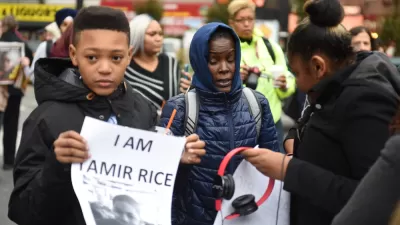A zoning code makeover is awaiting City Council approval in Baltimore. The proposed changes would help the city evolve from its industrial legacy.
"In 1971, Richard Nixon was president, gas cost 40 cents a gallon, bell bottoms were in style, and Baltimore's current zoning code was passed. A lot has changed since then, and Baltimore is rewriting its code in an effort to keep up," writes Gregory Friedman in a post that explains the potential effects of the zoning code process underway in Baltimore.
According to Friedman's analysis, the changes to Baltimore's zoning code would "provide a big boost for smart growth" by allowing for denser development and less parking in areas around rail transit stations. The new code also creates a new use category called Industrial Mixed-Use, which allows the adaptive reuse of obsolete industrial buildings for new life as live-work spaces or " workshops for industrial entrepreneurs." Friedman also notes the Neighborhood Commercial provision, where "structures in rowhouse neighborhoods that were once used as corner stores can once again be used for business."
The article goes on to detail the political delays holding up the approval of the zoning code, including the big question of whether to allow the City Council approval; power over certain conditional uses. Friedman concludes by listing the organizations doing the most work to support the changes included in the proposed zoning code.
FULL STORY: Baltimore is in line for a new zoning code. But just like in DC, it's taking a while

Planetizen Federal Action Tracker
A weekly monitor of how Trump’s orders and actions are impacting planners and planning in America.

San Francisco's School District Spent $105M To Build Affordable Housing for Teachers — And That's Just the Beginning
SFUSD joins a growing list of school districts using their land holdings to address housing affordability challenges faced by their own employees.

The Tiny, Adorable $7,000 Car Turning Japan Onto EVs
The single seat Mibot charges from a regular plug as quickly as an iPad, and is about half the price of an average EV.

Seattle's Plan for Adopting Driverless Cars
Equity, safety, accessibility and affordability are front of mind as the city prepares for robotaxis and other autonomous vehicles.

As Trump Phases Out FEMA, Is It Time to Flee the Floodplains?
With less federal funding available for disaster relief efforts, the need to relocate at-risk communities is more urgent than ever.

With Protected Lanes, 460% More People Commute by Bike
For those needing more ammo, more data proving what we already knew is here.
Urban Design for Planners 1: Software Tools
This six-course series explores essential urban design concepts using open source software and equips planners with the tools they need to participate fully in the urban design process.
Planning for Universal Design
Learn the tools for implementing Universal Design in planning regulations.
Smith Gee Studio
City of Charlotte
City of Camden Redevelopment Agency
City of Astoria
Transportation Research & Education Center (TREC) at Portland State University
US High Speed Rail Association
City of Camden Redevelopment Agency
Municipality of Princeton (NJ)





























